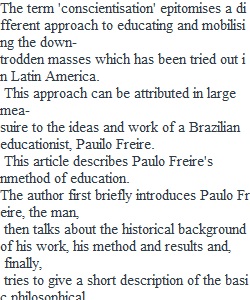


Q The Assignment: After reading Maria Mies' brief article, "Paulo Freire's Method of Education," Actions address the two questions below. Afterwards, you're asked to reply to two student posts, offering your impressions and thoughts about their answers. ? 1. What is the overarching purpose of eductions for Freire, based on Mies' analysis of Freire's pedagogy? ? 2. Why is the promotion of education, as described in Mies' article, considered a rebellious act, and how does your response shed more light on Freire's implied argument? Here's how this thing will work: 1. The deadline for your first post, wherein you offer your response to the above prompt, and your two reply posts (to other students in the class) is coming due soon. Your original post should be at least 250 words, and your two reply posts at least 100 words each. 2. The points for this assignment will go into the "pre-writing" column, so they carry a significant weight. Partial posts, or posts not meeting the word count will guarantee you, at most, only partial credit. So no whining later about getting run over by the bus if you didn't bother getting out of the way. Other: Forgive me for stating the obvious, but please consider this task as originating from an academic epicenter, which is to say that your responses should be cogent, clean, and stylistically appropriate to the academic environment in which we're engaged. If you're expletive-happy and enamored with the use of "u," "i," emojis, or other similar vagaries, it's time to fall out of love. Or, in deference to Yoda, "You must unlearn what you have learned." Got it? Good. Now let's move on. Peace.
View Related Questions